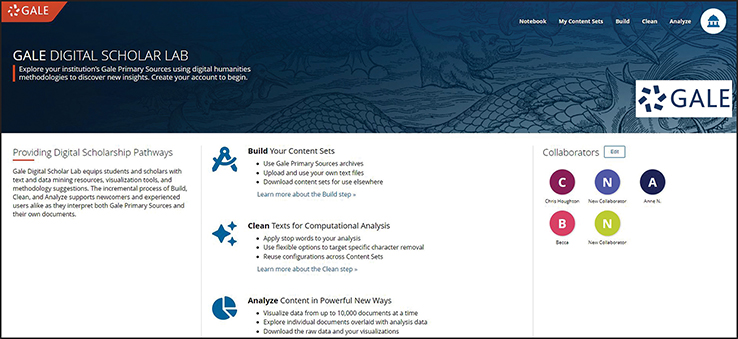Gale Digital Scholar Lab | eReview
Gale Digital Scholar Lab empowers users to aggregate large sets of digital humanities archival data while taking tech setup out of the process.
Gale Digital Scholar Lab
CONTENT Gale Digital Scholar Lab is a one-stop, cloud-based resource that empowers scholars and researchers to aggregate large sets of archival data and apply tools to parse and analyze that data. The lab offers several open-source instruments, including Mallet for text-mining, SciKit Learn to create sets, spaCy to tag parts of speech and recognize named entities, and two custom tools: Ngrams, which collocates words based on proximity, and Sentiment Analysis, which determines the number of positive or negative words in a given content set.
Analyzable content comes from Gale’s primary-source collections. However, some manuscript-based documents and items with rights restrictions—the British Literary Manuscripts Online, the Chatham House Archive, Early Arabic Printed Books, the Financial Times Historical Archive, State Papers Online, and the National Geographic Magazine Archive—are excluded. Users can examine up to 10,000 documents per dataset and download up to 5,000 documents for scholarly, noncommercial use. Beyond Gale’s collections, researchers can also upload .txt documents, edit text, apply metadata, and add to content sets. There is a limit of 10 megabytes per upload; access to uploaded data is limited to the individual.
USABILITY Tutorials, sample sets, and curriculum materials make it easy for students and instructors to engage with the resource’s available tools. Users curate a content set by first employing the Build tool to search available collections. This tool offers basic and advanced search options; it allows scholars to apply limiters and search multiple databases to find relevant resources, review selections, and add documents.
The Clean tool creates a “clean” configuration, allowing students to employ the same parameters as they prepare documents for analysis. These parameters function as templates and include options to modify, remove/replace textual matter, substitute text, characters, and punctuation, and add a list of stop words. After curating and cleaning the text, users can select from data-analysis tools that allow for document clustering, named-entity recognition, term collocation, parts-of-speech analysis, sentiment analysis, and topic modeling.
Additional materials include sample projects to enhance the curriculum: “Black America and the Law in the Mid-20th Century,” “The Rise of Electricity in the Late 19th and Early 20th Centuries,” and “Food and Civility 1650–1800.” These projects offer access to the content set so students can follow the steps outlined in the project guide. Educators can also enhance their course offerings with sample syllabi for digital humanities courses, a list of learning objectives, and templates for developing new projects.
PRICING Academic library pricing for Gale Digital Scholar Lab is based on a variety of factors, including but not limited to an institution’s archival holdings, full-time enrollment, product support requirements and other institutional variables. Contact a Gale representative for a quote. A free trial can be requested at gale.com/primary-sources/digital-scholar-lab/trial-request.
VERDICT Gale Digital Scholar Lab provides a suite of tools for research in the digital humanities while taking tech setup out of the process. There is no need to worry about maintaining software or providing enough server space for storage, as the tools are built-in and ready to use. An excellent resource for institutions seeking to expand their research and data-analysis offerings in the humanities.
RELATED
ALREADY A SUBSCRIBER? LOG IN
We are currently offering this content for free. Sign up now to activate your personal profile, where you can save articles for future viewing










Add Comment :-
Comment Policy:
Comment should not be empty !!!